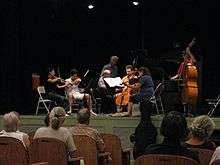Page-turner

A page-turner is a person employed to turn sheet music pages for a soloist, often a pianist, usually during a performance.[1]
While some music is arranged so that the pages end at places where the musician can spare one hand to turn them, this is not always possible. A page-turner is often necessary for musicians who are playing complex pieces and prefer not to play from memory. A page-turner needs to be able to understand the musician's signals and follow the music to know when to turn the page, and to do so quickly and unobtrusively. Page-turners are sometimes acquaintances of the performer or members of the accompanying orchestra doing a favour. Professional page-turners are often freelance casual workers, not associated with any given concert hall or orchestra.
Mechanical page-turners are also available,[2] sometimes controlled by the musician via a foot pedal.[3] Charles Hallé is said to have invented the automatic page-turner.[4] Foot pedals to turn pages are also available for music displayed on computers.[5]
See also
- The Page Turner
- Der Umblätterer
References
- ↑ Stamberg, Susan (2009). "Turning A Page? Better Consult A Professional". npr.org. Retrieved 13 March 2011.
- ↑ "Automatic page turner could help musicians and the disabled". web.mit.edu. 1999. Retrieved 12 March 2011.
- ↑ US patent 5962801, Tim Bowman, Ben Shepard, "Page turner", published 5 October 1999
- ↑ Siepmann, Jeremy (1998). The Piano. Milwaukee: Hal Leonard Corporation. p. 181. ISBN 0-7935-9976-8.
- ↑ Dobrin, Peter (22 April 2016). "Classical music page-turners turn the page into the modern era". The Philadelphia Inquirer. Retrieved 24 April 2016.